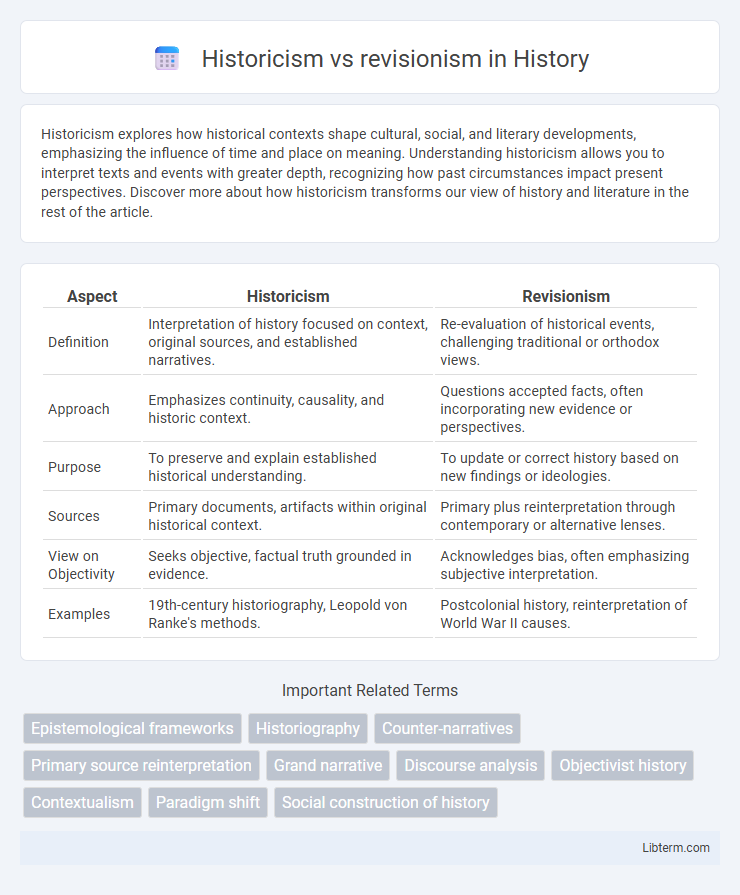Historicism explores how historical contexts shape cultural, social, and literary developments, emphasizing the influence of time and place on meaning. Understanding historicism allows you to interpret texts and events with greater depth, recognizing how past circumstances impact present perspectives. Discover more about how historicism transforms our view of history and literature in the rest of the article.
Table of Comparison
| Aspect | Historicism | Revisionism |
|---|---|---|
| Definition | Interpretation of history focused on context, original sources, and established narratives. | Re-evaluation of historical events, challenging traditional or orthodox views. |
| Approach | Emphasizes continuity, causality, and historic context. | Questions accepted facts, often incorporating new evidence or perspectives. |
| Purpose | To preserve and explain established historical understanding. | To update or correct history based on new findings or ideologies. |
| Sources | Primary documents, artifacts within original historical context. | Primary plus reinterpretation through contemporary or alternative lenses. |
| View on Objectivity | Seeks objective, factual truth grounded in evidence. | Acknowledges bias, often emphasizing subjective interpretation. |
| Examples | 19th-century historiography, Leopold von Ranke's methods. | Postcolonial history, reinterpretation of World War II causes. |
Understanding Historicism: Foundations and Principles
Historicism emphasizes the importance of understanding historical events within their specific cultural, social, and temporal contexts, rejecting universal or ahistorical interpretations. It relies on primary sources and the belief that historical phenomena must be studied as products of their unique environments, shaped by particular circumstances and values. This approach contrasts with revisionism, which often challenges established narratives by reinterpreting evidence or incorporating new perspectives.
What is Revisionism? A Modern Perspective
Revisionism reinterprets established historical narratives by incorporating new evidence and diverse perspectives, challenging traditional Historicism's focus on fixed interpretations. This modern approach emphasizes critical analysis and acknowledges the influence of contemporary contexts on historical understanding. Revisionism seeks to present a more nuanced and inclusive view of history, often reshaping national and cultural identities.
Key Differences Between Historicism and Revisionism
Historicism emphasizes interpreting historical events within their original context, valuing the understanding of past societies on their own terms. Revisionism challenges established historical narratives by re-examining evidence and offering new interpretations that often question traditional viewpoints. The key difference lies in historicism's focus on contextual fidelity versus revisionism's pursuit of updated or alternative perspectives based on reanalysis.
Historical Context: The Emergence of Both Approaches
Historicism emerged in the 19th century as a method emphasizing the importance of understanding historical events within their unique cultural, social, and temporal contexts to avoid presentist interpretations. Revisionism arose primarily in the 20th century as a response challenging established narratives, seeking to reinterpret historical events based on newly uncovered evidence or perspectives. Both approaches reflect evolving historiographical methodologies shaped by shifting academic priorities and broader intellectual trends such as positivism and postmodernism.
Influential Thinkers in Historicism and Revisionism
Influential thinkers in Historicism include Leopold von Ranke, who emphasized empirical evidence and primary sources to understand history as it truly happened, and Wilhelm Dilthey, who focused on understanding cultural and historical contexts through human experience. Revisionism features historians like E.H. Carr and Howard Zinn, who challenge traditional narratives by reinterpreting events with new perspectives or highlighting marginalized voices. These scholars shape ongoing debates about objectivity, bias, and the dynamic nature of historical interpretation.
Methodological Approaches: How History is Interpreted
Historicism relies on the contextual analysis of historical events, emphasizing the importance of understanding actions within their specific temporal and cultural frameworks. Revisionism challenges established narratives by re-examining evidence and offering alternative interpretations that question orthodox perspectives. Methodologically, historicism prioritizes fidelity to original sources and continuity, while revisionism employs critical scrutiny and new theoretical lenses to reinterpret historical data.
Major Controversies: Debates Between the Schools
Historicism emphasizes interpreting historical events within their original context, arguing that understanding the past requires analyzing the intentions, values, and conditions of that time. Revisionism challenges established historical narratives by re-examining evidence and often proposing alternative interpretations that highlight previously marginalized perspectives. Major controversies between the schools arise over issues such as objectivity in history, the role of ideology in shaping narratives, and the legitimacy of reinterpretations that challenge consensus views on events like the causes of World War I or the portrayal of colonialism.
Impact on Modern Historiography
Historicism in modern historiography emphasizes the context and continuity of historical events, shaping methodologies that analyze past occurrences within their unique temporal frameworks. Revisionism challenges traditional narratives by re-examining evidence and offering alternative interpretations, significantly influencing contemporary historical discourse and critical scholarship. The interplay between historicism and revisionism drives the evolution of historiographical standards, promoting a more nuanced and dynamic understanding of history.
Examples: Case Studies of Historicism and Revisionism
Historicist interpretations of the Treaty of Versailles emphasize its punitive measures as a cause of World War II, as seen in A.J.P. Taylor's analyses of interwar diplomacy. Revisionist case studies challenge this by highlighting economic instability and internal political failures in Germany, exemplified by the work of historian William Appleman Williams on American foreign policy after World War I. Both approaches utilize varied primary sources to reassess established narratives, reflecting ongoing debates in historiography regarding causation and responsibility.
Future Directions in Historical Interpretation
Future directions in historical interpretation emphasize integrating Historicism's contextual analysis with Revisionism's critical re-evaluation of established narratives. Advancements in digital humanities and interdisciplinary approaches enable more nuanced reconstructions of past events, highlighting previously marginalized perspectives. These evolving methodologies foster a dynamic understanding of history that continuously adapts to new evidence and contemporary values.
Historicism Infographic

 libterm.com
libterm.com